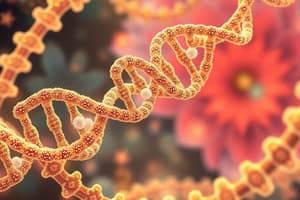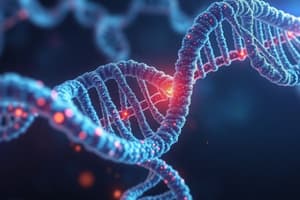Podcast
Questions and Answers
What does a genetic map show in relation to chromosomes?
What does a genetic map show in relation to chromosomes?
- The total number of genes
- The relative locations of specific markers (correct)
- The speed of DNA replication
- The size of the chromosomes
Which method randomly breaks up the genome into small DNA fragments for sequencing?
Which method randomly breaks up the genome into small DNA fragments for sequencing?
- Shotgun sequencing method (correct)
- Sanger sequencing method
- Polymerase Chain Reaction (PCR)
- Cloning
What is an example of a polymorphism that reflects a single-nucleotide difference?
What is an example of a polymorphism that reflects a single-nucleotide difference?
- Insertion mutation
- Gene duplication
- Restriction fragment length polymorphism (RFLP)
- Single-nucleotide polymorphism (SNP) (correct)
What is the main purpose of amplifying DNA in sequencing?
What is the main purpose of amplifying DNA in sequencing?
Which of the following technologies incorporates chain-terminating dideoxynucleotides for sequencing?
Which of the following technologies incorporates chain-terminating dideoxynucleotides for sequencing?
How many protein-coding genes are approximately found in humans?
How many protein-coding genes are approximately found in humans?
What phenomenon allows a single gene to produce multiple protein products?
What phenomenon allows a single gene to produce multiple protein products?
Which of the following animals has the highest estimated number of protein-coding genes?
Which of the following animals has the highest estimated number of protein-coding genes?
What percentage of the human genome comprises exons?
What percentage of the human genome comprises exons?
Which gene interaction type is characterized by alleles present at the same location of the homologous chromosome?
Which gene interaction type is characterized by alleles present at the same location of the homologous chromosome?
Which option describes a benefit of sequencing the human genome?
Which option describes a benefit of sequencing the human genome?
How many genes are estimated to be present per million base pairs on chromosome 19?
How many genes are estimated to be present per million base pairs on chromosome 19?
Which of the following statements is true about the applications of the Human Genome Project (HGP)?
Which of the following statements is true about the applications of the Human Genome Project (HGP)?
What type of gene interaction produces a classical ratio of 3:1?
What type of gene interaction produces a classical ratio of 3:1?
Which of the following gene types is NOT part of the categorizations based on gene behavior?
Which of the following gene types is NOT part of the categorizations based on gene behavior?
What is a potential outcome of dominance interactions among alleles?
What is a potential outcome of dominance interactions among alleles?
What was a primary goal of the Human Genome Project?
What was a primary goal of the Human Genome Project?
What defines a genome?
What defines a genome?
Which technology development goal was part of the Human Genome Project?
Which technology development goal was part of the Human Genome Project?
In the context of the Human Genome Project, what is a genetic map?
In the context of the Human Genome Project, what is a genetic map?
What is the significance of SNPs in genome analysis?
What is the significance of SNPs in genome analysis?
When was the Human Genome Project formally launched?
When was the Human Genome Project formally launched?
What is the role of bioinformatics tools in the Human Genome Project?
What is the role of bioinformatics tools in the Human Genome Project?
What is the primary component of DNA that is sequenced in the Human Genome Project?
What is the primary component of DNA that is sequenced in the Human Genome Project?
What is the phenotypic ratio associated with dominant epistasis?
What is the phenotypic ratio associated with dominant epistasis?
Which type of gene action produces a phenotypic ratio of 15:1?
Which type of gene action produces a phenotypic ratio of 15:1?
What are promoters in the context of eukaryotic gene expression?
What are promoters in the context of eukaryotic gene expression?
How do enhancers function in eukaryotic gene regulation?
How do enhancers function in eukaryotic gene regulation?
What is characterized by a 9:7 phenotypic ratio?
What is characterized by a 9:7 phenotypic ratio?
What distinguishes short-term gene regulation from long-term gene regulation in eukaryotes?
What distinguishes short-term gene regulation from long-term gene regulation in eukaryotes?
What type of gene expression involves the interaction of homozygous recessives producing novel phenotypes?
What type of gene expression involves the interaction of homozygous recessives producing novel phenotypes?
What level of gene regulation occurs at the stage of DNA unwinding and transcription initiation?
What level of gene regulation occurs at the stage of DNA unwinding and transcription initiation?
What is the primary function of RNA polymerase?
What is the primary function of RNA polymerase?
What role do transcription factors play in the transcription process?
What role do transcription factors play in the transcription process?
Which of the following mechanisms is involved in the regulation of mRNA production?
Which of the following mechanisms is involved in the regulation of mRNA production?
What effect does the presence of the 5' cap have on mRNA?
What effect does the presence of the 5' cap have on mRNA?
In what way does mRNA degradation influence protein synthesis?
In what way does mRNA degradation influence protein synthesis?
What identifies the proteins that are destined for degradation within a cell?
What identifies the proteins that are destined for degradation within a cell?
How do eukaryotic mRNAs generally compare to prokaryotic mRNAs in terms of stability?
How do eukaryotic mRNAs generally compare to prokaryotic mRNAs in terms of stability?
Where are proteases, the enzymes that degrade proteins, primarily located in a cell?
Where are proteases, the enzymes that degrade proteins, primarily located in a cell?
Flashcards are hidden until you start studying
Study Notes
Human Genome Project (HGP)
- The Human Genome Project (HGP) was an international scientific research project that aimed to determine the complete sequence of nucleotide base pairs that make up human DNA. It was launched in 1990 and completed in 2003.
- The HGP involved mapping, sequencing, and analyzing the human genome.
- Genes are specific sequences on DNA that can be expressed into proteins and other molecules.
- Genomes are the complete set of DNA in the nucleus of a cell.
- Goals of the HGP included obtaining a physical map of the genome, developing sequencing technology, obtaining the human DNA sequence, analyzing human sequence variation, creating bioinformatics tools, identifying genes and coding regions, sequencing other model organisms, and addressing ethical legal, and social implications.
Levels of Analysis
- Genome: The complete set of genes for an organism.
- Transcriptome: The complete set of messenger RNA molecules present in a cell.
- Proteome: The complete set of protein molecules present in a cell.
- Metabolome: The complete set of metabolites present in a cell.
Genetic Mapping
- Genetic maps characterize chromosomes by showing the relative locations of genetic markers.
- Genetic markers are inherited physical or molecular characteristics that are different among individuals of a population.
- Restriction Fragment Length Polymorphisms (RFLP) were used to identify genetic markers. RFLPs reflect sequence differences in DNA sites which are cleaved by restriction enzymes.
Single-Nucleotide Polymorphism (SNP)
- An SNP is a single-nucleotide difference in the sequence of two organisms.
- SNPs are found by sequencing and occur, on average, once between any two humans.
Sequencing Strategies
- To sequence DNA, it must first be amplified.
- Two types of amplification strategies are cloning and Polymerase Chain Reactions (PCR).
- Sequencing techniques used in the HGP include shotgun sequencing and Sanger sequencing.
Shotgun Sequencing
- Shotgun sequencing randomly breaks up the genome into small DNA fragments that are sequenced individually.
Sanger Sequencing
- Sanger sequencing uses chain-terminating nucleotides (ddNTPs) to stop DNA replication at specific points, allowing scientists to determine the order of nucleotides in a DNA strand.
Outcomes of the HGP
- There are approximately 22,300 protein-coding genes in humans.
- Humans share many homologous genes with other mammals, including mice, fruit flies, worms, and C. elegans.
- Each human gene can produce two to three different proteins due to alternative splicing.
- A larger proportion of the human genome is dedicated to control elements than in simpler organisms like Drosophila and C. elegans.
Gene Density
- Gene density varies among chromosomes, with chromosome 19 having 23 genes per million base pairs and chromosome 13 having 5 genes per million base pairs.
- Humans have genes not found in invertebrate animals.
Gene Structure and Function
- Genes are categorized into types based on their behavior, including basic genes, lethal genes, multiple genes, cumulative genes, pleiotropic genes, modifying genes, and inhibitory genes.
Gene Interactions
- Gene interactions can occur between alleles at the same locus (allelic interaction) or between genes at different loci (non-allelic interaction).
- Allelic interactions include complete dominance, incomplete dominance, codominance, dominant lethal, and recessive lethal patterns.
- Non-allelic interactions include epistatic gene interaction, where one gene masks the expression of another, and novel phenotypes.
- Examples of epistatic gene interaction include dominant epistasis, recessive epistasis, duplicate gene action, and complementary gene action.
Gene Expression
- Eukaryotic genes are regulated by a combination of protein-coding sequences and adjacent controlling sites.
- Eukaryotic gene regulation is more complex than prokaryotic gene regulation due to the presence of a nucleus.
- Eukaryotic gene expression is regulated at six levels: transcription, RNA processing, mRNA transport, mRNA translation, mRNA degradation, and protein degradation.
Transcription
- Promoters, specific DNA sequences upstream of the transcription start site, determine where and if transcription begins.
- Enhancers, DNA sequences located far from the gene, interact with transcription factors to modulate gene expression.
- Transcription factors are regulatory proteins that bind enhancer and promoter sequences to help RNA polymerase initiate transcription.
RNA Processing
- RNA processing regulates mRNA production from precursor RNAs through alternative polyadenylation and alternative splicing.
mRNA Transport
- It is regulated through the nuclear pores of the nuclear membrane, where mature mRNAs migrate.
mRNA Translation
- Translation is regulated by the 5' cap and the poly-A tail on the mRNA molecule.
mRNA Degradation
- The degradation of mRNAs is a key factor in regulating gene expression.
Protein Degradation
- Protein degradation is a last step in gene expression regulation and is carried out by proteases, enzymes that break down proteins.
- Proteasomes are protein complexes that bind protein molecules and degrade them.
Studying That Suits You
Use AI to generate personalized quizzes and flashcards to suit your learning preferences.




